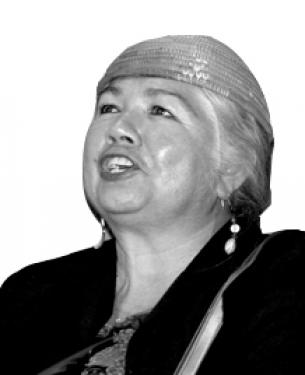
Dee Dominguez testified about the condor and burial sites at the hearing on Tejon Mountain Village before the Kern County Board of Supervisors October 5.
November Is National American Indian Heritage Month
By Patric Hedlund
Native American and conservation groups are buzzing with rumors that a deal is being secretly developed between Tejon Ranch Company interests and one or more tribes seeking federal recognition in this region. Talk of an Indian gambling casino are linked with this rumor.
Thirteen years ago Delia “Dee” Dominguez filed a Letter of Intent to petition for U.S. government recognition on behalf of her tribe. She is listed as the contact for the Tinoqui-Chalola Council of Kitanemuk and Yowlumne Tejon Indians. These families, she says, have inhabited “since time immemorial” the land later divided into the Spanish land grants that were consolidated in the mid-19th century to form what is today known as Tejon Ranch. Her letter is dated January 15, 1996. It is a first step toward securing federal recognition.
In an interview in October, Dominguez said the process to attain federal recognition is lengthy and that it rarely succeeds.
Kathryn Montes Morgan, chair of the Tejon Indian Tribe, which splintered from Dominguez’ tribe, filed a petition for federal recognition almost five years later, on October 27, 2000, according to federal records. She is Dominguez’ cousin, but their petitions for federal recognition—and the people they each represent—are separate.
Background
California became a state just as the ‘49er’s Gold Rush began. Prospectors and settlers were flooding in from other parts of the country and from around the world. They wanted Indian land. Morgan represents some of the native people of the San Joaquin Valley who were removed from their homelands in 1853 to California’s first reservation.
The Sebastian Indian Reservation was 75,000 acres at Tejon Pass in what was then Tulare County (today’s Kern County was carved from Tulare). The reservation was part of what became Tejon Ranch. Dominguez says her Kitanemuk and Yowlumne ancestors intermarried and that they were the native residents of the Tejon lands, living there long before the reservation was formed.
“The Yowlumne part of our family is from the mouth of the Kern River south, and the lands of the Katinemuk started at the base of the mountains to the east. We would gather acorns in that area and camp at Castac Lake and head over to Cuddy Valley to pick the best pine nuts; it would take a week to do that. They would also go up Pine Mountain. In the plains they had the elk runs between the mountains and Kern Lake—those are words from their mouth,” she says, telling a stirring tale about finding depositions in the Southwest Museum in Los Angeles after years of searching for evidence to support her family’s claim for tribal recognition. The depositions were given in 1922 for a court case filed by Indian people against Tejon Ranch, she said.
Fast Forward
This summer, Dominguez said she received news that another Native American group from this region had accelerated its efforts to obtain federal recognition. She was told that they had funds from an investor who paid for lawyers and lobbyists in Washington, D.C. That group was Kathryn Morgan’s Tejon Indian tribe.
Federal recognition of a tribe brings with it numerous benefits and privileges, including medical, housing and educational assistance. But the big prize in recent years has become the right to build an Indian gaming casino. Dominguez says her people are not interested in developing a casino.
This is how Dominguez puts it: “Our families’ journey toward federal recognition has been to reestablish the dignity and respect our families are entitled to as the Indigenous People of the land. In the beginning, ‘casino’ was not even a word in the room. That word has dramatically changed the way people around us interact with us, including those who say they are interested in helping us achieve our goal” of obtaining federal recognition.
Morgan, on the other hand, has said that a casino is likely to follow if her group receives federal recognition. It appears she has made a commitment to an investor who is counting on that happening.
On October 5 the Kern County Board of Supervisors voted unanimously to give the Tejon Mountain Village, LLC a green light to move forward with plans to develop multiple resort hotels—750 resort and spa rooms, plus 3,450 homes and a commercial center. During the hearing that preceded the vote, Attorney L. Adam Lazar (speaking on behalf of the Center for Biological Diversity about water concerns) asked the supervisors why no one had divulged that there are plans to build a casino on Tejon Ranch land. Supervisor McQuiston, who was chairing the hearing, sharply replied that he knew of no such plan.
Lobbyists
Searches of databases such as OpenSecrets.org by The Mountain Enterprise yield information that in 2008 lobbyist Patton Boggs, LLP is reported to have been paid $120,000 and lobbyist Tew Cardenas, LLP was paid $50,000 by the Tejon Indian Tribe. The industry category for their lobbying is listed as “Casino/Gambling.” Payments reported so far in 2009 declined to $20,000, paid to the Patton Boggs firm.
Interested legal analysts have noted Tejon Ranch’s use of secrecy in the past and speculate that if Tejon Ranch or its affiliates’ were involved in this effort, “it would be a money-laundering type of operation, not directly traceable to them….”
On Friday, Nov. 6 at 10:30 a.m. The Mountain Enterprise exchanged emails with Barry Zoeller, spokesman for Tejon Ranch Company. We asked if there is an agreement between Tejon Ranch or its affiliates with any Native American group seeking federal recognition. We also asked if any Tejon Ranch land (or that of any of its joint ventures or subsidiaries) is being considered as a location for a gaming casino. Zoeller answered “No” to both questions.
On Friday, Nov. 6 at 5 p.m. a report by Tami Mlcoch of Channel 17 news from Bakersfield showed Morgan and a group of about 30 people traveling onto Tejon Ranch land to visit a cemetery and a schoolhouse which Morgan said were established by her extended family. This is the same cemetery and schoolhouse which Dominguez claims and says her family has been maintaining for many years.
In that report, Morgan and Mlcoch said “a Las Vegas businessman,” who the group refused to name, has invested more than $200,000 in helping the Tejon band obtain federal recogniton. John Johnston, Ph.D. (of the Santa Barbara Museum of Natural History) confirmed the history of Morgan’s tribe being brought with other San Joaquin Valley Indian peoples to the reservation established on the ranch in the 1850s. While standing on the Tejon property, Morgan said she is seeking a “land base” along with her claim to recognition.
Dominguez’ tribe—the people who lived there traditionally— and some of Morgan’s tribe continued living on Tejon Ranch after the reservation was dismantled. They remained well into the 20th century, while the owners of the ranch tried many tactics to evict them, Dominguez said.
On the morning of November 6 The Mountain Enterprise asked Zoeller if Tejon Ranch Company or any of its business associates had provided funding to any California tribes to support efforts to seek federal recognition in Washington D. C. Zoeller again answered, “No.”
Channel 17 carried this statement from Tejon Ranch Company on its 5 p.m. report that day: “Tejon Ranch has absolutely no plans nor any interest in selling any of its property, or using any of its land for the development of an Indian gaming casino.”
This is part of the November 13, 2009 online edition of The Mountain Enterprise.
Have an opinion on this matter? We'd like to hear from you.


